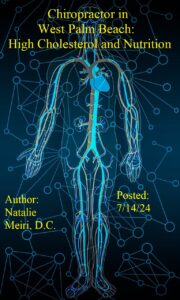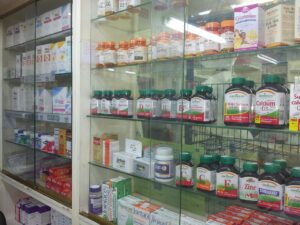
The leading cause of death in the United States is coronary artery (heart) disease (CAD or CHD). It is probably also the leading cause of disability. Although there are numerous factors leading to the development of coronary heart disease (CHD), it appears there are four major risk factors: cigarette smoking, hypertension, diabetes, and hyperlipidemia. Chiropractor in West Palm Beach: High Cholesterol and Nutrition is about nutritional supplementation/diet and lifestyle changes to help Hyperlipidemia (high cholesterol).
Chiropractor in West Palm Beach: Wellness is Important
The emphasis must be on lifestyle changes to lower cholesterol, including not smoking and the management of the other three risk factors. And the second leading cause of death by disease is cancer. Next, the third leading cause of death is diabetes. Furthermore, a high fat diet has been implicated as leading to cancer. Of course, adult-onset diabetes is linked to diet as well. Indeed, wellness is attained starting with healthful eating and exercise.
Chiropractor in West Palm Beach: PHYSIOLOGY regarding High Cholesterol
Firstly, cholesterol is not in and of itself the problem. Cholesterol is a waxy substance made by your liver. It is used for important functions, such as making hormones, nervous system function and digesting fatty foods. However, too much cholesterol can cause plaques in blood vessels. Plaques can cause inflammation, rupture and cause clots, leading to a heart attack.
Secondly, the liver makes half of the body’s cholesterol. The other half is acquired by diet.
Thirdly, there are two main fats carried in the blood: cholesterol and triglycerides. These are packaged with proteins (apoproteins) into lipoproteins.
Fourthy, the lipoproteins are classified based on the density. So the higher the triglyceride content, the less dense they are. The three main lipoproteins are: high density lipoproteins (HDLs), low density lipoproteins (LDLs), and very-low-density lipoproteins (VLDLs). In addition, LDLs contain about 75% lipid and 25% protein, whereas HDLs contain an equal ratio.
Fifthly, the VLDLs produced in the liver transport triglycerides to cells. And when the VLDLs have lost enough of the triglyceride, they become LDL particles. LDL then provides cholesterol to the cells. And any excess of LDL is metabolized in the liver, providing cholesterol for bile (stored in gallbladder). So LDLs that are oxidized are potentially more harmful. It appears LDLs effect the arterial wall, and possibly through antibodies developed against the oxidized (free radical reaction) LDLs.
Lastly, HDLs are produced in the liver and assist in transfer of apoproteins among the other lipoproteins. Indeed, HDLs may be protective by a reverse cholesterol transport-carrying process. HDLs carry excess cholesterol to other lipoproteins or to the liver.
Chiropractor in West Palm Beach: What is Hyperlipidemia
Hyperlipidemia (high cholesterol) is when you have an increase in either plasma cholesterol or plasma triglycerides. These may occur in combination or in one form. Typically, there are three main causes: (1) dietary, (2) genetic, and (3) secondary to other diseases or drugs. And the mildest is the dietary cause.
Chiropractor in West Palm Beach: Genetic/Familial hypercholesterolemia
The genetic cause of high LDLc is familial hypercholesterolemia. Due to a defect in the LDL receptor gene, there is a reduced ability to process LDLc particles. Subsequently, this results in an LDLc level that is almost twice that of normal. However, to make matters worse, many patients have even higher LDLc from their high dietary intake. As a result, these patients have an increased risk of developing coronary artery (heart) disease in their 30s and 40s. In conclusion, although there appears to be a genetic component, poor diet and lack of exercise make the disorder much worse. Exercise and weight loss are pivotal to gaining normal cholesterol levels.
Chiropractor in West Palm Beach: Some Facts about cholesterol
Ideal serum cholesterol values are below 200 mg/dl. Values above 240 mg/dl require further analysis by your primary care doctor. Coronary risk factors are: male gender, cigarette smoking, hypertension, severe obesity, diabetes, family history of premature (before age 55) coronary heart disease, diagnosed cardiovascular or peripheral vascular disease, low high density lipoprotein (HDL) cholesterol (below 35 mg/dl). For adults, a normal triglyceride level is below 150 mg/dL. Your total cholesterol looks at a combination of triglycerides, HDL and LDL numbers. If your triglycerides and LDL cholesterol are high, but your HDL is low, you have an increased risk of heart attack and stroke.
The chart below summarizes some of the various levels:
| (LDLc) Elevation LDL Cholesterol:
<100: Optimal 100-129: Near optimal/above optimal 130-159: Borderline high 160-189: High ~190: Very high
|
Total Cholesterol
<200: Desirable 200-239: Borderline high ~240: High
|
HDL Cholesterol
<40: Low ~6 0: High
|
(
Chiropractor in West Palm Beach: Helpful Supplementation/Nutritional Recommendations for High Cholesterol
Apple pectin– it binds to fats and heavy metal, thereby lowering cholesterol levels
Calcium- suggested that a high calcium intake may reduce lipid absorption by forming indigestible calcium-lipid complexes
Chinese red yeast rice extract- has cholesterol lowering abilities in body
Chromium picolinate- needed for normal metabolism of fats, including cholesterol. Research shows a link between higher chromium intake and healthier arteries and levels of blood cholesterol
Coenzyme Q10- plus Coenzyme A- improves circulation, boosts immune system and metabolism
Fiber (oat bran or guargum)- Soluble fiber (e.g. oatmeal) can reduce the absorption of cholesterol into your bloodstream.
Garlic– may inhibit the synthesis of cholesterol
L-carnitine- helps by increasing HDL cholesterol, inhibiting LDL cholesterol production
Lecithin granules/capsules or Lipotropic factors- A fat emulsifier; cholesterol lowering
Vitamin A with mixed carotenoids- if you are taking cholesterol lowering drugs (deplete this) this will help boost your immune system
Complex of vitamin B plus extra vitamin Bi (thiamine) and vitamin B3 (niacin)- helps lower cholesterol
Bioflavonoids with Vitamin C – helps lower cholestrol
Vitamin E- improves circulation
Essential fatty acids (black currant seed oil, borage oil, fish oil, primrose oil)- natural blood thinner and reduces LDL levels
Proteolytic enzymes- prevents the oxidation of cholesterol. When cholesterol becomes oxidized it sticks to and builds up in blood vessel walls forming plaques.
Selenium- defieciency has shown to lead to CHD- heart disease
Shiitake extract or reishi extract- in some studies Reishi was able to decrease total cholesterol, triglycerides, and LDL cholesterol while increasing HDL cholesterol
Herbs- Cayenne (capsicum), goldenseal, and hawthorn berries help to lower cholesterol. Cinnamon has been shown to lower cholesterol.
Chiropractor in West Palm Beach: Diet/Lifestyle for High Cholesterol
Eat foods with high soluble fiber. Soluble fiber lowers cholesterol by binding it to the small intestine. Once inside the small intestine, the fiber attaches to the cholesterol particles, preventing them from entering your bloodstream. So instead, cholesterol will exit the body through the feces. For instance, oats, oatmeal, oat bran, whole grains, whole fruits (apples) and legumes (beans, peas).
Include the following cholesterol-lowering foods in your diet: almonds, apples, bananas, carrots (flushes out bile in liver so lowers cholesterol), cold-water fish, dried beans, garlic, grapefruit, oats, olive oil, salmon, strawberries, and walnuts. Strawberries in particular were shown to reduce damage from oxidation to the bad (LDL) cholesterol, thereby lowering the risk of heart disease.
Reduce the amount of saturated fat and cholesterol in your diet. Saturated fats include all fats of animal origin as well as coconut and palm oils.Use vegetable oils that are liquid at room temperature, such as olive, soybean, flax seed, primrose, and black currant seed oil. Olive oil is best. Do not eat any nuts except raw, unsalted pecans, walnuts, and almonds.
Eliminate from the diet all hydrogenated fats and hardened fats and oils such as margarine, lard, and butter. Eliminate heated fats or processed oils. And avoid fried or fatty foods. It’s important to read food product labels in detail. Choose nonfat milk, low-fat cottage cheese, and skinless white poultry meat (preferably turkey), but only in moderation.
Do not consume alcohol, cakes, candy, carbonated drinks, coffee, gravies, nondairy creamers, pies, processed or refined foods, refined carbohydrates, tea, tobacco, or white bread.
In large amounts, coffee can elevate blood cholesterol levels, more than doubling the risk of heart disease. Cream substitutes (nondairy coffee creamers) are not good alternatives to cholesterol-heavy dairy products. This is because it has coconut oil, which is a highly saturated fat. Instead, use Soy milk or almond milk.
Get regular moderate exercise daily. Try to de-stress and avoid continued tension. Incorporate stress release techniques.

Chiropractor in West Palm Beach: Your Nervous System and Health
As chiropractors, we believe in the concept of wellness for our patients and we recognize things like receiving chiropractic adjustments, exercising, eating healthy/good nutrition and sleep hygiene as important parts of a wellness program. Such a wellness program will certainly lower your risk of developing CHD and lowering cholesterol.
Finally, this is where your chiropractic adjustment comes in. Getting regular adjustments to get your body aligned keeps your nervous system at it’s optimum which helps the rest of your body function better. Chiropractic adjustments helps manage stress levels, improves your overall health and keeps you moving.
Contact your Chiropractor in West Palm Beach at 561-253-8984 today to make an appointment or to learn more about Chiropractor in West Palm Beach: High Cholesterol and Nutrition.
References: Handbook of Preventative and Therapeutic Nutrition by James M. Gerber,M.S., D.C.
Prescription for Nutritional Healing (3rd edition), Phyllis A. Balch, CNC
Thomas Souza, (2018) Differential Diagnosis and Management for the Chiropractor
*Please consult your doctor (M.D. who is monitoring your condition) about the above supplements.